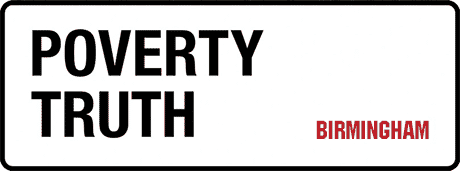Our second Birmingham Poverty Truth Commission has now finished. The Commission started with a small group of people experiencing the struggle against poverty, (Community Commissioners), who came together with a commitment to see social change using their personal testimonies as the foundation. In the initial stages of the commission, this group built relationships with each other enabling trust to develop.
Community Commissioners described being part of the commission as a ‘sense of belonging’, a ‘solidarity’ and ‘feeling of not being alone’.
After a few months of working together the Community Commissioners invited key strategic people to a special launch event. In preparation for the Launch, local poet Amerah Saleh came along to a few sessions with the Community Commissioners and created a poem ‘Our Truth’ with them. This was performed during the launch by Amerah and the whole group.
Following the launch, individuals in positions of influence and policy making in the city were then invited to join the Commission as Civic Commissioners. This graphic gives an engaging overview of our journey. One of the aspects of our work was to document our experiences and conversations in poster form. This booklet was then collated from the work.
The first Birmingham Poverty Truth Commission – a brief overview:
In March 2017 we began Phase 1 of the first Birmingham Poverty Truth Commission. Our group, known then as ‘Testifying Commissioners’, began meeting together and getting to know one another. Relationships built as the group shared their experiences and they began to plan for a launch event to tell their stories to invited guests.
On 12th October 2017, people of influence in the city, business, public, faith and third sector, together with friends and family came to a launch event at the MAC, to hear some of our commissioner’s experiences, told in their own words and in a variety of different ways. This was a very powerful experience for all in the room. At the end of the launch event influential people from business, university, media, housing, police, education and third sector accepted an invitation to join as City Leader Commissioners with the Testifying Commissioners to form the full, first Birmingham Poverty Truth Commission.
In Phase 2, the full Commission met together to build relationships, share experiences, and think about how they might better respond to the challenges poverty brings. Our three main themes emerged from these conversations as ‘Education, the cost of sending a child to school’, ‘Mental Health and Wellbeing’, and ‘Housing and Homelessness’
Birmingham Poverty Truth Commission was an incredible journey. We went from a group of strangers to a family; getting to know each other, sharing our experiences and lives, and learning from each other. We are very proud of our Report, detailing our experiences and impacts:
We were also delighted to have a film made about our process; commissioned and funded by the Church of England, Birmingham, with additional funding from Barrow Cadbury Trust. We are extremely grateful for their support. Our Filmmaker was Mat Beckett from River Rea Films.
We are thrilled that you can now watch this film for yourself:
Background to the Poverty Truth Commission Movement
The Black Civil Rights Movement in the USA would not have made progress had white people dominated its leadership. Similarly the Feminist Movement would not have achieved what it has, had men been running the show. And so a movement to tackle poverty needs to have people who experience it at its heart if real change is to be achieved. “Nothing about Us without Us is for Us”
Scotland’s Poverty Truth Commission and Leeds Poverty Truth Challenge operate with a very similar model, underpinned by the same principles. They both bring together two distinct groups of people: business, civic, political and faith leaders; and an equal number of people who struggle against poverty on a daily basis. They focus on: building relationships; encouraging change within the organisations, institutions and communities that the commissioners come from; developing shared work between the two different groups of commissioners; and making policy proposals around key areas of anti-poverty work identified through the experience and knowledge of the commissioners.
